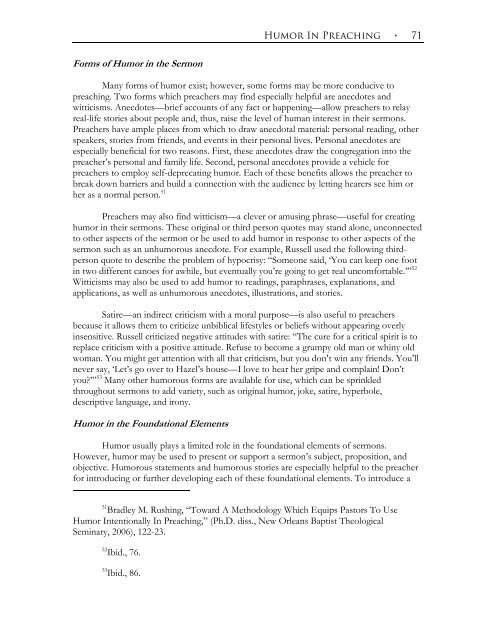0 jbtm vol. 6, no. 2 the proclamation of the gospel - Baptist Center for ...
0 jbtm vol. 6, no. 2 the proclamation of the gospel - Baptist Center for ...
0 jbtm vol. 6, no. 2 the proclamation of the gospel - Baptist Center for ...
Create successful ePaper yourself
Turn your PDF publications into a flip-book with our unique Google optimized e-Paper software.
Forms <strong>of</strong> Humor in <strong>the</strong> Sermon<br />
Humor In Preaching ٠ 71<br />
Many <strong>for</strong>ms <strong>of</strong> humor exist; however, some <strong>for</strong>ms may be more conducive to<br />
preaching. Two <strong>for</strong>ms which preachers may find especially helpful are anecdotes and<br />
witticisms. Anecdotes—brief accounts <strong>of</strong> any fact or happening—allow preachers to relay<br />
real-life stories about people and, thus, raise <strong>the</strong> level <strong>of</strong> human interest in <strong>the</strong>ir sermons.<br />
Preachers have ample places from which to draw anecdotal material: personal reading, o<strong>the</strong>r<br />
speakers, stories from friends, and events in <strong>the</strong>ir personal lives. Personal anecdotes are<br />
especially beneficial <strong>for</strong> two reasons. First, <strong>the</strong>se anecdotes draw <strong>the</strong> congregation into <strong>the</strong><br />
preacher’s personal and family life. Second, personal anecdotes provide a vehicle <strong>for</strong><br />
preachers to employ self-deprecating humor. Each <strong>of</strong> <strong>the</strong>se benefits allows <strong>the</strong> preacher to<br />
break down barriers and build a connection with <strong>the</strong> audience by letting hearers see him or<br />
her as a <strong>no</strong>rmal person. 51<br />
Preachers may also find witticism—a clever or amusing phrase—useful <strong>for</strong> creating<br />
humor in <strong>the</strong>ir sermons. These original or third person quotes may stand alone, unconnected<br />
to o<strong>the</strong>r aspects <strong>of</strong> <strong>the</strong> sermon or be used to add humor in response to o<strong>the</strong>r aspects <strong>of</strong> <strong>the</strong><br />
sermon such as an unhumorous anecdote. For example, Russell used <strong>the</strong> following thirdperson<br />
quote to describe <strong>the</strong> problem <strong>of</strong> hypocrisy: “Someone said, ‘You can keep one foot<br />
in two different ca<strong>no</strong>es <strong>for</strong> awhile, but eventually you’re going to get real uncom<strong>for</strong>table.’” 52<br />
Witticisms may also be used to add humor to readings, paraphrases, explanations, and<br />
applications, as well as unhumorous anecdotes, illustrations, and stories.<br />
Satire—an indirect criticism with a moral purpose—is also useful to preachers<br />
because it allows <strong>the</strong>m to criticize unbiblical lifestyles or beliefs without appearing overly<br />
insensitive. Russell criticized negative attitudes with satire: “The cure <strong>for</strong> a critical spirit is to<br />
replace criticism with a positive attitude. Refuse to become a grumpy old man or whiny old<br />
woman. You might get attention with all that criticism, but you don=t win any friends. You=ll<br />
never say, ‘Let’s go over to Hazel’s house—I love to hear her gripe and complain! Don’t<br />
you?’” 53 Many o<strong>the</strong>r humorous <strong>for</strong>ms are available <strong>for</strong> use, which can be sprinkled<br />
throughout sermons to add variety, such as original humor, joke, satire, hyperbole,<br />
descriptive language, and irony.<br />
Humor in <strong>the</strong> Foundational Elements<br />
Humor usually plays a limited role in <strong>the</strong> foundational elements <strong>of</strong> sermons.<br />
However, humor may be used to present or support a sermon’s subject, proposition, and<br />
objective. Humorous statements and humorous stories are especially helpful to <strong>the</strong> preacher<br />
<strong>for</strong> introducing or fur<strong>the</strong>r developing each <strong>of</strong> <strong>the</strong>se foundational elements. To introduce a<br />
51 Bradley M. Rushing, “Toward A Methodology Which Equips Pastors To Use<br />
Humor Intentionally In Preaching,” (Ph.D. diss., New Orleans <strong>Baptist</strong> Theological<br />
Seminary, 2006), 122-23.<br />
52 Ibid., 76.<br />
53 Ibid., 86.


